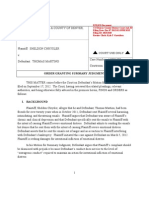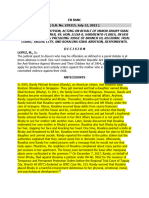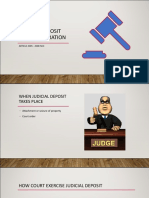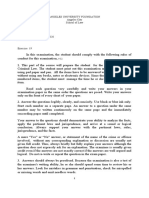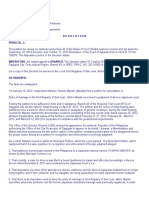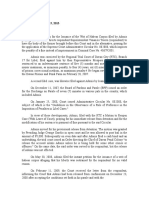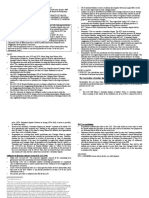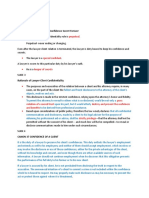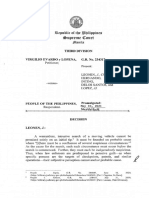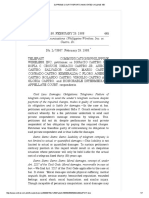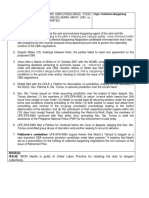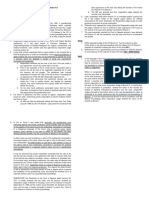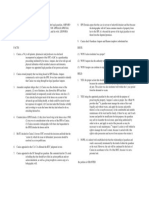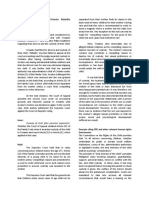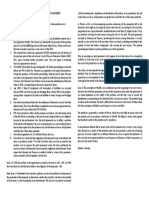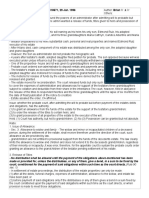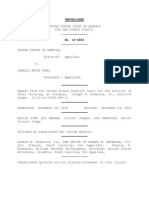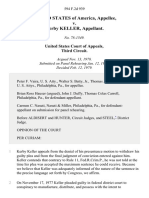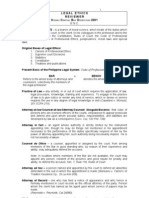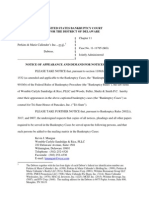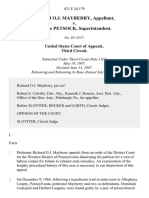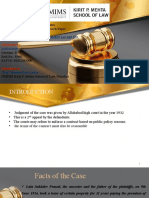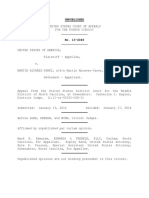Conflict of Laws Case Digest: HASEGAWA vs KITAMURA 538 SCRA 26 (2007) KAZUHIRO HASEGAWA and NIPPON ENGINEERING CONSULTANTS CO., LTD., vs MINORU KITAMURA G.R. No. 149177 November 23, 2007 FACTS: Nippon Engineering Consultants (Nippon), a Japanese consultancy firm providing technical and management support in the infrastructure projects national permanently residing in the Philippines. The agreement provides that Kitamaru was to extend professional services to Nippon for a year. Nippon assigned Kitamaru to work as the project manager of the Southern Tagalog Access Road (STAR) project. When the STAR project was near completion, DPWH engaged the consultancy services of Nippon, this time for the detailed engineering & construction supervision of the Bongabon-Baler Road Improvement (BBRI) Project. Kitamaru was named as the project manger in the contract.
Hasegawa, Nippon’s general manager for its International Division, informed Kitamaru that the
company had no more intention of automatically renewing his ICA. His services would be engaged by the company only up to the substantial completion of the STAR Project.
Kitamaru demanded that he be assigned to the BBRI project. Nippon insisted that Kitamaru’s c
ontract was for a fixed term that had expired. Kitamaru then filed for specific performance & damages w/ the RTC of Lipa City. Nippon filed a MTD.
Nippon’s contention: The ICA had been perfected in Japan & executed by & between Japanese
nationals. Thus, the RTC of Lipa City has no jurisdiction. The claim for improper pre-termination of
Kitamaru’s ICA could only be heard & ventilated in the proper cou
rts of Japan following the principles of lex loci celebrationis & lex contractus. The RTC denied the motion to dismiss. The CA ruled hat the principle of lex loci celebrationis was not applicable to the case, because nowhere in the pleadings was the validity of the written agreement put in issue. It held that the RTC was correct in applying the principle of lex loci solutionis. ISSUE: Whether or not the subject matter jurisdiction of Philippine courts in civil cases for specific performance & damages involving contracts executed outside the country by foreign nationals may
be assailed on the principles of lex loci celebrationis, lex contractus, “the state of the most significant relationship rule,” or forum non conveniens.
HELD: NO. In the judicial resolution of conflicts problems, 3 consecutive phases are involved: jurisdiction, choice of law, and recognition and enforcement of judgments. Jurisdiction & choice of law are 2 distinct concepts. Jurisdiction considers whether it is fair to cause a defendant to travel to this state; choice of law asks the further question whether the application of a substantive law w/c will determine the merits of the case is fair to both parties. The power to exercise jurisdiction does not automatically give a state constitutional authority to apply forum law. While jurisdiction and the choice of the
lex fori
will often coincide, the “minimum contacts” for one do not always provide the necessary “significant contacts” for the other.
The question of whether the law of a state can be applied to a transaction is different from the question of whether the courts of that state have jurisdiction to enter a judgment. In this case, only the 1
st
phase is at issue
—
jurisdiction. Jurisdiction, however, has various aspects. For a court to validly exercise its power to adjudicate a controversy, it must have jurisdiction over the plaintiff/petitioner, over the defendant/respondent, over the subject matter, over the issues of the case and, in cases involving property, over the
res
or the thing w/c is the subject of the litigation.In assailing the trial court's jurisdiction herein, Nippon is actually referring to subject matter jurisdiction. Jurisdiction
over the subject matter
in a judicial proceeding is conferred by the sovereign authority w/c establishes and organizes the court. It is given only by law and in the manner prescribed by law. It is further determined by the allegations of the complaint irrespective of whether the plaintiff is entitled to all or some of the claims asserted therein. To succeed in its motion for the dismissal of an action for lack of jurisdiction over the subject matter of the claim, the movant must show that the court or tribunal cannot act on the matter submitted to it because no law grants it the power to adjudicate the claims. In the instant case, Nippon, in its MTD, does not claim that the RTC is not properly vested by law w/ jurisdiction to hear the subject controversy for a civil case for specific performance & damages is one not capable of pecuniary estimation & is properly cognizable by the RTC of Lipa City.What they
rather raise as grounds to question subject matter jurisdiction are the principles of
lex loci celebrationis
and
lex contractus
,
and the “state of the most significant relationship rule.” Th
e Court finds the invocation of these grounds unsound.
Lex loci celebrationis
relates to the “law of the place of the ceremony”
or the law of the place where a contract is made. The doctrine of
lex contractus
or
lex loci contractus
means the “law of the p
lace where a
contract is executed or to be performed.”
It controls the nature, construction, and validity of the contract and it may pertain to the law voluntarily agreed upon by the parties or the law intended by them either expressly or implicitly. Under
the “state of the most significant relationship rule,” to
ascertain what state law to apply to a dispute, the court should determine which state has the most substantial connection to the occurrence and the parties. In a case involving a contract, the court should consider where the contract was made, was negotiated, was to be performed, and the domicile, place of business, or place of incorporation of the parties.This rule takes into account several contacts and evaluates them according to their relative importance with respect to the particular issue to be resolved. Since these 3 principles in conflict of laws make reference to the law applicable to a dispute, they are rules proper for the 2
nd
phase, the choice of law. They determine which state's law is to be applied in resolving the substantive issues of a conflicts problem. Necessarily, as the only issue in this case is that of jurisdiction, choice-of-law rules are not only inapplicable but also not yet called for.
Further, Nippon’s premature
invocation of choice-of-law rules is exposed by the fact that they have not yet pointed out any conflict between the laws of Japan and ours. Before determining which law should apply, 1
st
there should exist a conflict of laws situation requiring the application of the conflict of laws rules. Also, when the law of a foreign country is invoked to provide the proper rules for the solution of a case, the existence of such law must be pleaded and proved. It should be noted that when a conflicts case, one involving a foreign element, is brought before a court or administrative agency, there are 3 alternatives open to the latter in disposing of it: (1) dismiss the case, either because of lack of jurisdiction or refusal to assume jurisdiction over the case; (2) assume jurisdiction over the case and apply the internal law of the forum; or (3) assume jurisdiction over the case and take into account or apply the law of some other State or States.
The court’s power to hear
cases and controversies is derived from the Constitution and the laws. While it may choose to recognize laws of foreign nations, the court is not limited by foreign sovereign law short of treaties or other formal agreements, even in matters regarding rights provided by foreign sovereigns. Neither can the other ground raised,
forum non conveniens
, be used to deprive the RTC of its jurisdiction. 1st, it is not a proper basis for a motion to dismiss because Sec. 1, Rule 16 of the Rules of Court does not include it as a ground. 2nd, whether a suit should be entertained or dismissed on the basis of the said doctrine depends largely upon the facts of the particular case and is addressed to the sound discretion of the RTC. In this case, the RTC decided to assume jurisdiction. 3rd, the propriety of dismissing a case based on this principle requires a factual determination; hence, this conflicts principle is more properly considered a matter of defense.
3. COMMUNICATION MATERIALS AND DESIGN, INC et al vs.CA et al.G.R. No. 102223August 22, 1996 FACTS p
etitioners COMMUNICATION MATERIALS AND DESIGN, INC., (CMDI) and ASPAC MULTI-TRADE INC., (ASPAC)are both domestic corporations.. Private Respondents ITEC, INC. and/or ITEC, INTERNATIONAL, INC. (ITEC) are corporations duly organized and existing under the laws of the State of Alabama, USA. There is no dispute that ITEC is a foreign corporation not licensed to do business in the Philippines. ITEC entered into a contract with ASPAC referred to as
“Representative
Agreement”.
Pursuant to the contract, ITEC engaged ASPAC as its
“exclusive
representative”
in the Philippines for the sale of
ITEC’s
products, in consideration of which, ASPAC was paid a stipulated commission. Through a
“License
Agreement”
entered into by the same parties later on, ASPAC was able to incorporate and use the name
“ITEC”
in its own name. Thus , ASPAC Multi-Trade, Inc. became legally and publicly known as ASPAC-ITEC (Philippines).One year into the second term of the
parties’
Representative Agreement, ITEC decided
to terminate the same, because petitioner ASPAC allegedly violated its contractual commitment as stipulated in their agreements. ITEC charges the petitioners and another Philippine Corporation, DIGITAL BASE COMMUNICATIONS, INC. (DIGITAL), the President of which is likewise petitioner Aguirre, of using knowledge and information of
ITEC’s
products specifications to develop their own line of equipment and product support, which are similar, if not identical to
ITEC’s
own, and offering them to
ITEC’s
former customer. The complaint was filed with the RTC-Makati by ITEC, INC. Defendants filed a MTD the complaint on the following grounds: (1) That plaintiff has no legal capacity to sue as it is a foreign corporation doing business in the Philippines without the required BOI authority and SEC license, and (2) that plaintiff is simply engaged in forum shopping which justifies the application against it of the principle of
“forum
non
conveniens”.
The MTD was denied. Petitioners elevated the case to the respondent CA on a Petition for Certiorari and Prohibition under Rule 65 of the Revised ROC. It was dismissed as well. MR denied, hence this Petition for Review on Certiorari under Rule 45.
ISSUE
:1. Did the Philippine court acquire jurisdiction o ver the person of
the petitioner corp, despite allegations of lack of capacity to sue
because of non-registration? 2. Can the Philippine court give due course to the suit or dismiss it, on the principle of forum non convenience?
HELD p
etition dismissed.1. YES; We are persuaded to conclude that ITEC had been
“engaged
in”
or
“doing
business”
in the Philippines for some time now. This is the inevitable result after a scrutiny of the different contracts and agreements entered in toby ITEC with its various business contacts in the country. Its arrangements, with these entities indicate convincingly that ITEC is actively engaging in business in the country. A foreign corporation doing business in the Philippines may sue in Philippine Courts although not authorized to do business here against a Philippine citizen or entity who had contracted with and benefited by said corporation. To put it in another way, a party is estopped to challenge the personality of a corporation after having acknowledged the same by entering into a contract with it. And the doctrine of estoppel to deny corporate existence applies to a foreign as well as to domestic corporations. One who has dealt with a corporation of foreign origin as a corporate entity is estopped to deny its corporate existence and capacity. In Antam Consolidated Inc. vs. CA et al. we expressed our chagrin over this commonly used scheme of defaulting local companies which are being sued by unlicensed foreign companies not engaged in business in the Philippines to invoke the lack of capacity to sue of such foreign companies. Obviously, the same ploy is resorted to by ASPAC to prevent the injunctive action filed by ITEC to enjoin petitioner from using knowledge possibly acquired in violation of fiduciary arrangements between the parties.2. YES;
Petitioner’s
insistence on the dismissal of this action due to the application, or non application, of the private international law rule of forum non conveniens defies well-settled rules of fair play. According to petitioner, the Philippine Court has no venue to apply its discretion whether to give cognizance or not to the present action, because it has not acquired jurisdiction over the person of the plaintiff in the case, the latter allegedly having no personality to sue before Philippine Courts. This argument is misplaced because the court has already acquired jurisdiction over the plaintiff in the suit, by virtue of his filing the original complaint. And as we have already observed, petitioner is not at liberty to question
plaintiff’s
standing to sue, having already acceded to the same by virtue of its entry into the Representative Agreement referred to earlier. Thus, having acquired jurisdiction, it is now for the Philippine Court, based on the facts of the case, whether to give due course to the suit or dismiss it, on the principle of forum non convenience. Hence, the Philippine Court mayrefuse to assume jurisdiction in spite of its having acquired jurisdiction. Conversely, the court may assume jurisdiction over the case if it choses to do so provided that the
following requisites are met: (a) that the Philippine courts would be the court to which the parties would conveniently resort to. (b)that the Philippine courts is in a position to make an intelligent decision as to the law and the facts. (c)that the Philippine court has or is likely to have power to enforce its decisions. The aforesaid requirements having been met, and in view of the
court’s
disposition to give due course to the questioned action, the matter of the forum not being the most convenient as ground for the suits dismissal deserves scant consideration. 4.
Hongkong and Shanghai Banking Corporation vs. Jack Robert Sherman
G.R. No. 72494 11 August 1989 Medialdea, J: Facts: Eastern Book Supply Service PTE, Ltd., a company incorporated in Singapore applied with, and was granted by, the Hongkong and Shanghai Banking Corporation Singapore branch an overdraft facility in the maximum amount of Singapore dollars 200,000.00 (which amount was subsequently
increased to Singapore dollar 375,000.00). As a security for the repayment bythe COMPANY of the sum advanced, Jack Robert Sherman and Deodato Reloj, herein private respondents, and a certain Robin de Clive Lowe, all of whom were directors of said COMPANY at such time, executed a Joint and Several Guarantee in favor of petitioner BANK whereby they agreed to pay, jointly and severally, on demand all sums owed by the COMPANY to petitioner BANK under the aforestated overdraft facility. The Joint and Several Guarantee provides that: "This guarantee and all rights, obligations and liabilities arising hereunder shall be construed and determined under and may be enforced in accordance with the laws of the Republic of Singapore. We hereby agree that the Courts of Singapore shall have jurisdiction overall disputes arising under this guarantee . . ." The COMPANY failed to pay its obligation. Thus, petitioner BANK demanded payment from the private respondents, conformably with the provisions of the Joint and Several Guarantee. Inasmuch as the private respondents still failed to pay, petitioner BANK filed a civil case for a collection of a sum of money against Sherman and Reloj before the Regional Trial Court of Quezon City. In turn, the private respondents filed a motion to dismiss on the ground of lack of jurisdiction over the subject matter of the complaint and over the persons of the defendants, but, it was denied. Subsequently, the court granted the petition for prohibition with preliminary injunction. Hence, this petition for review on certiorari. Issue: Whether or not Philippine courts have jurisdiction over the suit. Held: Yes. The parties did not stipulate that only the courts of Singapore, to the exclusion of all the rest, has jurisdiction. Neither did the clause in question operate to divest Philippine courts of jurisdiction. In International Law, jurisdiction is often defined as the right of a State to exercise authority over persons and things within its boundaries subject to certain exceptions. This authority, which finds its source in the concept of sovereignty, is exclusive within and throughout the domain of the State. A State is competent to take hold of any judicial matter it sees fit by making its courts and agencies assume jurisdiction over all kinds of cases brought before them. While it is true that
“the
transaction took place in Singaporean
setting”
and that law not offend traditional notions of fair play and substantial justice. One basic principle underlies all rules of jurisdiction in International Law: a State does not have jurisdiction in the absence of some reasonable basis for exercising it, whether the proceedings are in rem quasi in rem or in personam. To be reasonable, the jurisdiction must be based on some minimum contacts that will not offend traditional notions of fair play and substantial justice. The defense of private respondents that the complaint should have been filed in Singapore is based merely on technicality. They did not even claim, much less prove, that the filing of the action here will cause them any unnecessary trouble, damage, or expense. On the other hand, there is no showing that petitioner BANK filed the action here just to harass private respondents.
5. Sweet Lines Inc. vs. Teves, et. Al. G.R. No. L-37750 May 19, 1978
Lessons Applicable: Contract of Adhesion (Transportation) Laws Applicable:



